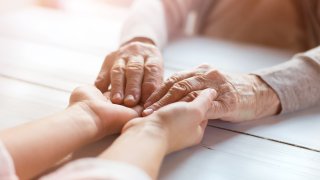
The news of the mass shooting in Maine can be difficult, overwhelming and even triggering for some adults and children.
Dr. Laura Saunders, a psychologist at the Institute of Living in Hartford, recommends parents start by asking their children what they know.
“That's a good sort of frame of reference to go off of. So, what do they know? What have they heard? If they've heard nothing and they don't seem to be of interest, I'm probably not going to probe them and go much further. If they’ve heard some things, then it's about providing basic fact-based information,” said Dr. Saunders.
That of course requires adults to be aware of the basic facts about what happened. But Dr. Saunders recommends you do your best to limit your kids’ exposure to that information.
Get Connecticut local news, weather forecasts and entertainment stories to your inbox. Sign up for NBC Connecticut newsletters.
That can be more difficult when children are older and have access to the traumatic videos of the shooting on social media.
“They get access to information at a rate that we as parents just don't have good control over. And at that point, I worry about what I would call points of connection, right? Anyone who's had recent losses, or any sort of traumatic experience, is going to feel something like this, even if they don't know anyone up in Maine, they're going to feel something a little bit more deeply. Those are the young people that I want to approach and have a conversation with,” Dr. Saunders said.
Dr. Saunders said this mass shooting in Maine, combined with the war in the Middle East, can be overwhelming and that is why it is important to give yourself a break from it.
Local
“There's so much in the way of images that can be really, really painful. And honestly, it becomes overwhelming very quickly. So, finding ways to decrease that stimulation or to turn things off when necessary, because the bottom line is we have to go back to our day-to-day functioning,” Dr. Saunders said.
As more details are released about the suspect’s mental health difficulties, Dr. Saunders adds, “what I don't want is for people to be afraid of anyone that has a mental health difficulty. People that struggle with significant mental illness are far more likely to be a danger to themselves than to others. Individuals need our support and our compassion. They don't need us to target them.”



